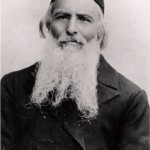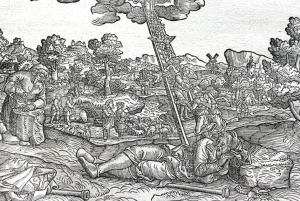 Last Saturday, my wife and daughter held a garage sale. I wasn’t there because I went with my son to his college orientation. When I arrived home, Priscilla couldn’t wait to tell me this story.
Last Saturday, my wife and daughter held a garage sale. I wasn’t there because I went with my son to his college orientation. When I arrived home, Priscilla couldn’t wait to tell me this story.
Mid-morning a woman drove up in a late model black Mercedes Benz. She nosed around then offered Priscilla and Chloe a quarter—that’s twenty-five cents—for a brand new bulletin board they had priced at a buck. In the spirit of garage sales, Priscilla countered, “50 cents!” The woman hesitated then packed the bulletin board in the back seat of her car. She rummaged around and came back with 30 cents. Nonplussed, Priscilla took the money, and away the woman drove in her late model black Mercedes Benz.
Almost immediately Priscilla’s story reminded me, by contrast, of the church in Antioch way back in the first century. I’ve written about this church in Fresh Air because I fell in love with it as I studied the New Testament book of Acts. You can find the whole story there, on pages 150-165, under the subtitle, “A Vibrant Community.”
For now, I want to recall just one episode in the life of the church in Antioch: the time when a prophet named Agabus came up from Jerusalem to Antioch and predicted a famine. By way of response,
“the disciples [in Antioch] determined that according to their ability, each would send relief to the believers living in Judea; this they did …” (Acts 11:29-30).
There are a couple of things to note here that divide their world from ours—and it’s not just gold-plated chariots versus late model black Mercedes Benzes.
The first thing that divides us (if we’re honest) is that we tend to give in response to tragedies. For example, if there’s a tsunami, I give to World Vision. A mudslide in nearby Oso? I hop online and give to the American Red Cross. Chemical weapons in Syria earn a donation to Doctors without Borders. Political prisoners? That’s Amnesty International territory. You get the point: I give after a tragedy rather than before.
The Christians in Antioch gave before there was a famine. They didn’t wait for the famine to take place in order to put a band-aid on the problem. They didn’t wait for people to starve before parting with their hard-earned cash.
This means, of course, that they didn’t know how much was needed, since the famine hadn’t yet happened. Their giving had to be determined by an internal barometer rather than an external one.
Which leads me to my main point: they didn’t give just what was needed. They gave on the basis of what they had to give. Their generosity, in other words, came from their sense of having enough, even more than enough.
The Greek words, in fact, which usually get translated as “according to their ability,” to describe the measure of their charity, could also mean “as anyone had plenty.” Plenty, of course, is a relative term. Obviously, a good many of the Christians in Antioch felt they had, not just enough, but plenty, so much, in fact, that they sent help to soon-to-be hungry people far away in Judea.
Their giving wasn’t determined by how much was needed but by how much they had to give. We have no clue that the prophet Agabus did anything more than announce the famine; he didn’t order them to give, tell them who should give, or how much. The believers in Antioch simply decided to give because they felt they had enough, even plenty.
Maybe there is a culture of garage sales, an unwritten rule of bartering, that’s lost on us. But the lack of generosity that would prompt a woman to take a 50 cent bulletin board, stick it in the back seat of her late model black Mercedes Benz, and come out with 30 cents stuns me.
I’m not exactly like this woman. For starters, I don’t own a late model black Mercedes Benz! But I’m not exactly like the Christians in Antioch, either. I wish I were. I wish I experienced, deep down in my gut, the impulse of unharnessed generosity.












